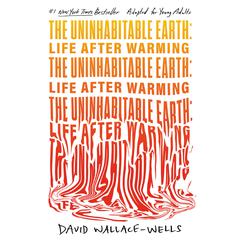 Play Audiobook Sample
Play Audiobook Sample
The Uninhabitable Earth: Life After Warming Audiobook
 Play Audiobook Sample
Play Audiobook Sample
Quick Stats About this Audiobook
Total Audiobook Chapters:
Longest Chapter Length:
Shortest Chapter Length:
Average Chapter Length:
Audiobooks by this Author:
Publisher Description
#1 NEW YORK TIMES BESTSELLER • “The Uninhabitable Earth hits you like a comet, with an overflow of insanely lyrical prose about our pending Armageddon.”—Andrew Solomon, author of The Noonday Demon With a new afterword It is worse, much worse, than you think. If your anxiety about global warming is dominated by fears of sea-level rise, you are barely scratching the surface of what terrors are possible—food shortages, refugee emergencies, climate wars and economic devastation. An “epoch-defining book” (The Guardian) and “this generation’s Silent Spring” (The Washington Post), The Uninhabitable Earth is both a travelogue of the near future and a meditation on how that future will look to those living through it—the ways that warming promises to transform global politics, the meaning of technology and nature in the modern world, the sustainability of capitalism and the trajectory of human progress. The Uninhabitable Earth is also an impassioned call to action. For just as the world was brought to the brink of catastrophe within the span of a lifetime, the responsibility to avoid it now belongs to a single generation—today’s. Praise for The Uninhabitable Earth “The Uninhabitable Earth is the most terrifying book I have ever read. Its subject is climate change, and its method is scientific, but its mode is Old Testament. The book is a meticulously documented, white-knuckled tour through the cascading catastrophes that will soon engulf our warming planet.”—Farhad Manjoo, The New York Times “Riveting. . . . Some readers will find Mr. Wallace-Wells’s outline of possible futures alarmist. He is indeed alarmed. You should be, too.”—The Economist “Potent and evocative. . . . Wallace-Wells has resolved to offer something other than the standard narrative of climate change. . . . He avoids the ‘eerily banal language of climatology’ in favor of lush, rolling prose.”—Jennifer Szalai, The New York Times “The book has potential to be this generation’s Silent Spring.”—The Washington Post “The Uninhabitable Earth, which has become a best seller, taps into the underlying emotion of the day: fear. . . . I encourage people to read this book.”—Alan Weisman, The New York Review of Books
Download and start listening now!
"Wallace-Wells' book is dark and foreboding but it is impossible to dismiss its importance. Extremely well-researched, with every aspect and impact of climate change covered thoughtfully and in depth. Meant to inform and to jar the reader out of any last vestiges of denial, but references no junk science nor resorts to gratuitous scare tactics. It is political when necessary. And yes, there are some positions of hope taken, though you have to work your way through the book to understand why hope is a reasonable conclusion. Does his own narration, which is excellent."
— TomC (5 out of 5 stars)
Quotes
-
“The book has potential to be this generation’s Silent Spring.”
— Washington Post -
“Riveting…Some readers will find Mr. Wallace-Wells’s outline of possible futures alarmist. He is indeed alarmed. You should be, too.”
— The Economist (London) -
“The book is a meticulously documented, white-knuckled tour through the cascading catastrophes that will soon engulf our warming planet.”
— New York Times -
“Powerfully argued. . . . A masterly analysis of why—with a world of solutions—we choose doom.”
— Nature
Awards
-
A #1 Amazon.com bestseller
-
New York Times bestseller
-
A New York Times Book Review Editor’s Choice
-
Longlisted for the 2020 Andrew Carnegie Medal for Excellence in Nonfiction
-
Shortlisted for the Foyles Book of the Year in Nonfiction
-
Longlisted for the 2020 PEN/E. O. Wilson Literary Science Writing Award
-
Longlisted for the PEN/John Kenneth Galbraith Award for Nonfiction
-
A New Yorker Best Books of the Year selection
-
A New York Times Book Review Notable Book of 2020
-
Time Magazine Book of the Year
-
The Economist Best Book of 2020
-
A Toronto Star Book of Note for 2020
-
A GQ Magazine Best Book of the Year
-
An NPR Best Book of 2020
-
A Paris Review Selection of 2020's Best Books
-
Times Literary Supplement Best Book of 2020
-
New York Public Library Best Book of the Year
-
Among longlisted titles for Andrew Carnegie Medal for Excellence in Nonfiction, 2020
-
Among longlisted titles for PEN/E. O. Wilson Literary Science Writing Award, 2020
The Uninhabitable Earth Listener Reviews
Be the first to write a review about this audiobook!
About David Wallace-Wells
David Wallace-Wells is deputy editor of New York magazine, where he also writes frequently about climate change and the near future of science and technology. In July 2017 he published a cover story surveying the landscape of worst-case scenarios for global warming that became an immediate sensation, reaching millions of readers on its first day and, in less than a week, becoming the most-read story the magazine had ever published and sparking an unprecedented debate, ongoing still today among scientists and journalists, about just how we should be thinking, and talking, about the planetary threat from climate change.
























